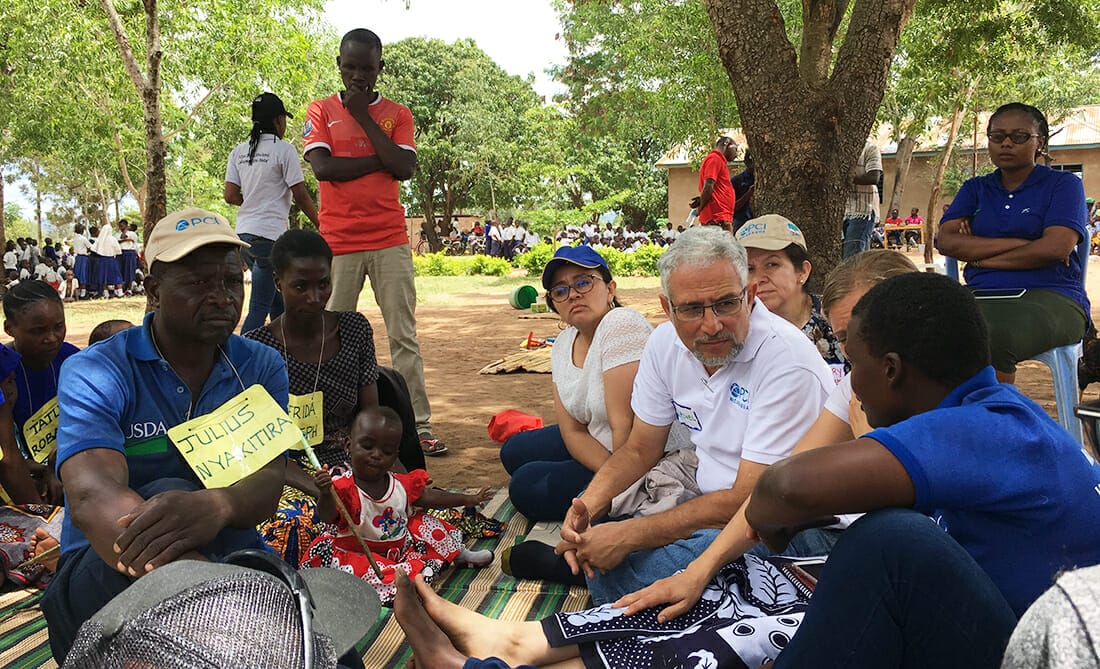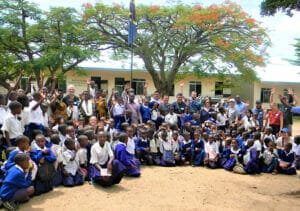News > Blog
Meeting of the Minds: Sharing knowledge across PCI’s school feeding programs
Published 03/03/2020 by Global Communities

Different languages and long distances often make supporting each other and sharing best practices across programs difficult. To overcome these barriers and help foster intra-organizational learning, PCI recently brought together nearly 30 staff members from four different countries for the 2nd Annual Applied Learning Workshop (ALW) in Tanzania.
The primary purpose of the gathering was to help country teams who are implementing school feeding programs exchange tools, successes, challenges and strategies. Participants included senior leaders and representatives from various technical areas, including health and nutrition, commodity and logistics, monitoring, learning and evaluation, and agriculture.
“As development professionals and practitioners, we often see learning as an outward-looking process, but I can’t underscore enough the value of looking inward to figure out what you’re doing and learning from your own activities and programs to build and make yourself better,” said Mazen Fawzy, PCI’s Senior Director of Food, Nutrition and Livelihood Security. “[This workshop] was a dynamic learning event for all of us with a big conglomeration of ideas and talents.”

As part of the 2nd annual Applied Learning Workshop in Tanzania, PCI staff from Guatemala, Nicaragua and the United States visited schools participating in PCI’s USDA-supported McGovern-Dole International Food for Education and Child Nutrition programs. Photo by Victor Mapile/PCI
Since 2001, PCI has partnered with the U.S. Department of Agriculture to implement McGovern-Dole International Food for Education and Child Nutrition (MGD) programs, serving more than one million students in Bolivia, Guatemala, Nicaragua and Tanzania. Currently, PCI implements both MGD and Local and Regional Food Aid Procurement (LRP) programs in Guatemala, Nicaragua and Tanzania. Through these programs, over 300,000 children receive a healthy meal each school day.
As part of the second annual ALW, the PCI/Tanzania team took colleagues from Guatemala, Nicaragua and the United States on field visits to both MGD and LRP schools in the Mara region. With live interpretation, participants were able to interact with teachers, students, parents and school officials who are currently involved with the school feeding programs. By touring school gardens, libraries, classrooms, kitchens, latrines and storage facilities, PCI staff were able to observe the similarities and differences between their respective country’s projects and offer advice on areas of improvement.
“We have the same interventions and indicators, but the implementation of the services is quite different,” said Mary Lyimu, a District Health & Nutrition Support Officer for PCI/Tanzania. “It’s good that we learned from each other, because it evaluates from each country what we really have to focus on and which areas we have to improve.”
Following field visits, the country teams engaged in a three-day workshop to discuss best practices, tools and approaches to sustainability, graduation and transition strategies, literacy, behavior change, data for decision making, community mobilization and agriculture. Teams also tackled creating action plans for their specific school feeding programs that will incorporate at least one element from another country’s model.
Last year, for example, PCI/Tanzania made improvements to its warehouse based on suggestions from PCI/Guatemala, while PCI/Guatemala adopted sexual and reproductive health interventions from PCI/Tanzania. This year, PCI/Tanzania will adapt some of PCI/Guatemala’s nutritious recipe materials, while PCI/Guatemala plans to pilot menstrual hygiene management activities from PCI/Tanzania.
“In terms of the return on investment for workshops like this, some of it is tangible and some of it is intangible,” Fawzy said. “A number of practices end up being incorporated based on experiential learning, but then there’s also the relationship building, the flow of information and the exchanges which continue beyond the ALW.”
As the week wrapped up, country teams swapped gifts, celebrated their accomplishments, and said their goodbyes with hopes of another ALW in Nicaragua later this year. Participants left feeling energized, inspired to try new things in their programs and committed to ongoing collaboration with one another as PCI continues its efforts to take hunger out of the classroom.
“So much of the time we focus on communicating with donors and external partners or talking amongst ourselves in-country, but we also need to sustain this focus on cross-organizational exchange,” said José Murguía, Program Director for PCI/Guatemala. “It is so important for us to document, systematize and strengthen these lessons learned.”
Story written by Tanner Roark.





